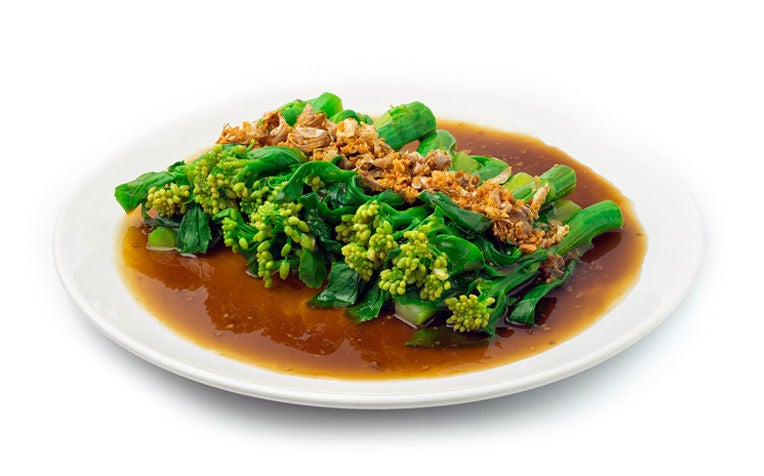
Kai-lan (Gai lan) isn't just tasty and easy-to-prepare, it also has a host of health benefits.
Dietitian Jodie Yeo from Sengkang Community Hospital (SKCH), under SingHealth Community Hospitals (SCH), a member of the SingHealth group, shares the benefits of this commonly eaten vegetable.
Kai-Lan or Gai lan is the Cantonese name for Chinese broccoli or Chinese kale. Affordable, easy to prepare and available all year round, this vegetable is popular and commonly found.
Health benefits of kai-lan
1. Rich in antioxidants
Kai-lan like many vegetables are nutrient dense and contains a variety of healthy nutrients including vitamin A and C. These nutrients act as antioxidants that can protect your body against oxidative damage, may help to boost the immune system and reduce risk for certain cancers. Vitamin A can also help to maintain good eyesight.
Cooking kai-lan with healthy oils (such as canola oil, olive oil, peanut oil) can help in the absorption of fat-soluble vitamin A. However, avoid over cooking kai-lan, which may reduce the availability of vitamin C and overall nutritional quality.
2. Source of folate
Green leafy vegetables, including kai-lan, are a source of folate needed for the body to form red blood cells and for those pregnant, prevent neural tube defects during fetal development.
3. High in fibre
The high fibre content of kai-lan can prevent constipation and promote good bowel health. Fibre in kai-lan can also fill you up faster and reduce your urge to eat more or snack between meals.
4. Source of potassium
Potassium in fruits and vegetables, including kai-lan, may reduce one’s risk of high blood pressure. Potassium, together with vitamin K, magnesium and calcium found in kai-lan, can promote healthy bones.
Remember to also include whole grains, lean proteins and other colourful fruits and vegetables as part of a healthy balanced diet.
RECIPE BONUS: Ever had iced kai-lan with wasabi and soy sauce from Peony Jade? Get the exclusive recipe by hitting the link.
Also, check out our interview with Chef Ricky Liew of Peony Jade!
Nutritional analysis of kai-lan
A 100g serving of cooked kai-lan (3/4 mug) has:
Energy | 22 calories |
Dietary Fibre | 2.5g |
Vitamin A | 82μg |
Vitamin C | 28mg |
Folate | 99μg |
Potassium | 261mg |
Vitamin K | 85μg |
Magnesium | 18mg |
Calcium | 100mg |
Ref: L20
Check out our other food and nutrition articles:
Dried Fruits: Nutritional Benefits
Tea, Is It Healthier Than Coffee?
5 Super Foods for Beautiful Skin
Contributed by

















 Get it on Google Play
Get it on Google Play